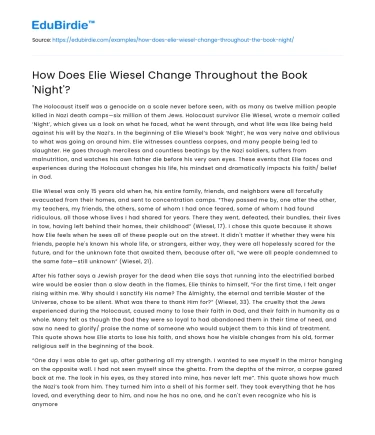The Holocaust itself was a genocide on a scale never before seen, with as many as twelve million people killed in Nazi death camps—six million of them Jews. Holocaust survivor Elie Wiesel, wrote a memoir called ‘Night’, which gives us a look on what he faced, what he went through, and what life was like being held against his will by the Nazi’s. In the beginning of Elie Wiesel’s book ‘Night’, he was very naive and oblivious to what was going on around him. Elie witnesses countless corpses, and many people being led to slaughter. He goes through merciless and countless beatings by the Nazi soldiers, suffers from malnutrition, and watches his own father die before his very own eyes. These events that Elie faces and experiences during the Holocaust changes his life, his mindset and dramatically impacts his faith/ belief in God.
Elie Wiesel was only 15 years old when he, his entire family, friends, and neighbors were all forcefully evacuated from their homes, and sent to concentration camps. “They passed me by, one after the other, my teachers, my friends, the others, some of whom I had once feared, some of whom I had found ridiculous, all those whose lives I had shared for years. There they went, defeated, their bundles, their lives in tow, having left behind their homes, their childhood” (Wiesel, 17). I chose this quote because it shows how Elie feels when he sees all of these people out on the street. It didn't matter if whether they were his friends, people he's known his whole life, or strangers, either way, they were all hopelessly scared for the future, and for the unknown fate that awaited them, because after all, “we were all people condemned to the same fate—still unknown” (Wiesel, 21).
Save your time!
We can take care of your essay
- Proper editing and formatting
- Free revision, title page, and bibliography
- Flexible prices and money-back guarantee
After his father says a Jewish prayer for the dead when Elie says that running into the electrified barbed wire would be easier than a slow death in the flames, Elie thinks to himself, “For the first time, I felt anger rising within me. Why should I sanctify His name? The Almighty, the eternal and terrible Master of the Universe, chose to be silent. What was there to thank Him for?” (Wiesel, 33). The cruelty that the Jews experienced during the Holocaust, caused many to lose their faith in God, and their faith in humanity as a whole. Many felt as though the God they were so loyal to had abandoned them in their time of need, and saw no need to glorify/ praise the name of someone who would subject them to this kind of treatment. This quote shows how Elie starts to lose his faith, and shows how he visible changes from his old, former religious self in the beginning of the book.
“One day I was able to get up, after gathering all my strength. I wanted to see myself in the mirror hanging on the opposite wall. I had not seen myself since the ghetto. From the depths of the mirror, a corpse gazed back at me. The look in his eyes, as they stared into mine, has never left me”. This quote shows how much the Nazi’s took from him. They turned him into a shell of his former self. They took everything that he has loved, and everything dear to him, and now he has no one, and he can't even recognize who his is anymore. He has experienced so much, and seen so many things, that he shouldn't have at such a young age, and that alone scarred him. This experience is something that will stick to him, and is something that he will/could never forget even if he wanted to.
The whole experience he had during the Holocaust changes him, not only physically, but emotionally and spiritual as well. Not only did the Nazis take away his innocence, and his family, but they stripped him of faith entirely, and of his view on humanity.






 Stuck on your essay?
Stuck on your essay?

